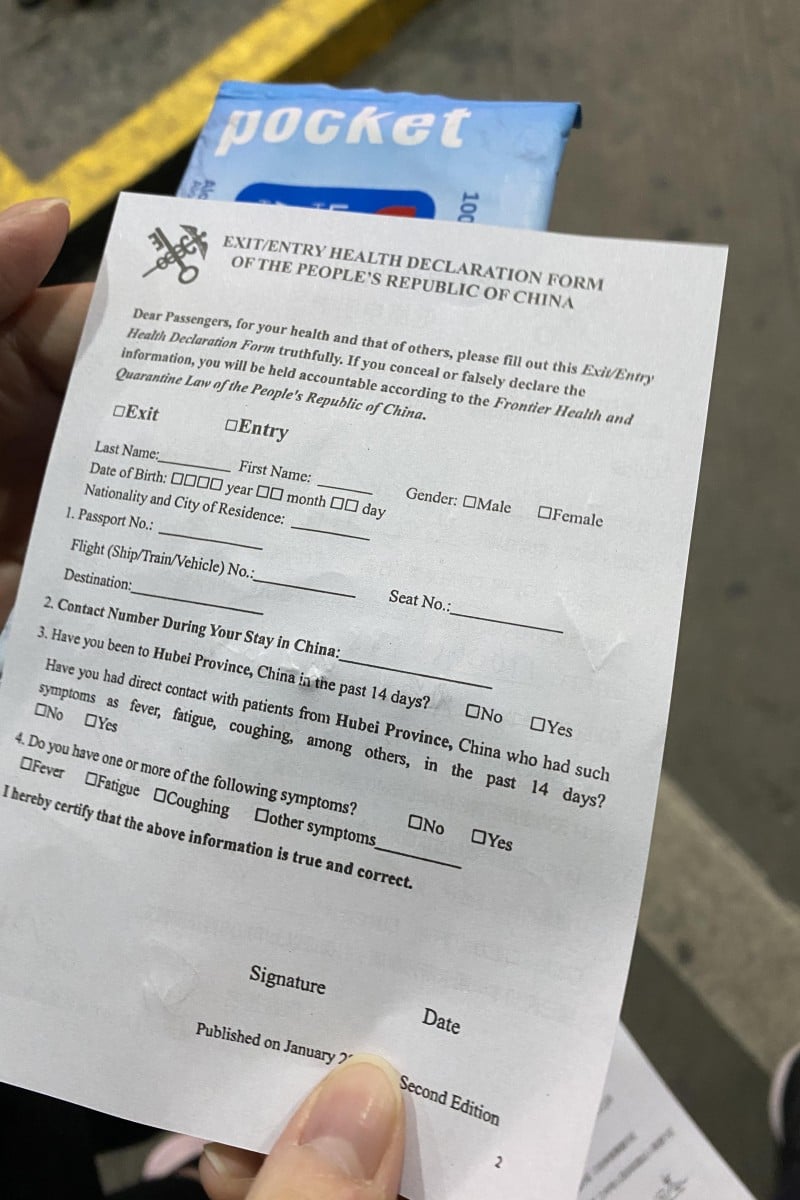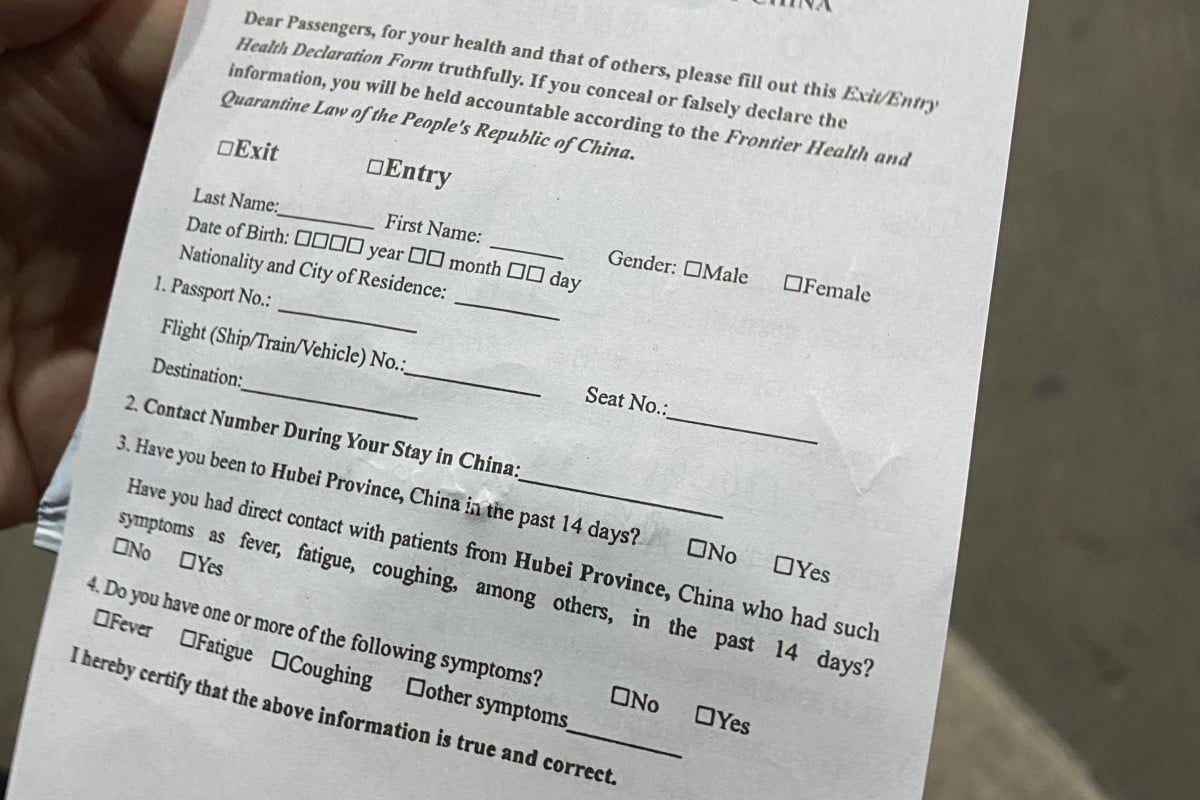
Coronavirus outbreak: A first-hand account of living in self-quarantine in Shenzhen
As people take precautions against the deadly virus, one reporter discusses the fear and surreal experience of living in an empty city in China, across the border from Hong Kong
 The health declaration form at immigration relied solely on the person's willingness to tell the truth.
The health declaration form at immigration relied solely on the person's willingness to tell the truth.Carefully, I took out a pack of alcohol wipes and two medical grade masks that I brought back from Europe, and scrambled for a pen, all before I’d even stepped out of the car at the Hong Kong-Shenzhen border.
Well-armed, I hesitated a bit, seeing that barricades have now blocked off a large area, as well as custom officers in head-to-toe protective gear. I took a deep breath, and decided to finish what I’d started.
Hong Kong schools close until March 2 amidst coronavirus fears
To my utter surprise, despite the surging death toll and confirmed cases - already in the hundreds and thousands then, respectively, it took me no more than 5 minute to fill out the so-called health declaration form, and mere seconds to pass through the first checkpoint. The form, according to the Hong Kong government, is a way to minimise cross-border transmissions - all cases to date have originated, in one way or another, from the Mainland Chinese city of Wuhan.
In addition to what you’d usually expect from a declaration form, there was of course the all-important question of “Have you been to Hubei Province, China, in the past 14 days?” I ticked no, since I’d just returned from Paris.
However, I couldn’t help but wonder - if I were indeed to have just returned from Wuhan, and was scared of being quarantined in another city - was there any way at all to stop me from entering Shenzhen and vice versa by just ticking no?
Indeed, infrared thermal detectors were almost everywhere. However, the SCMP has reported numerous times that the incubation period could last up to 14 days, with various symptoms not limiting to fevers. Moreover, the potential and proven risk of cross-border travel is also the reason behind the city-wide strike amongst Hong Kong medical staff, starting today.
I then carried on with scanning my ID and thumb print. Again, no more than a few minutes, and no queues, too!
Upon arriving on the Shenzhen side of the border, I was stunned. The city that I’d spent the first 15 years of my life in was almost unrecognisable at first glance - the usual hustle and bustle at luxury goods stores located at the customs were all shut with no exception. Only two to three private vehicles, and a single tour bus were in the waiting area.
Debunking fake news about the coronavirus
Whist I cannot imagine what life is now like in Wuhan and other cities under complete lockdown, what I’ve experienced in Shenzhen is perhaps not that different at all. For the first two days, I spent all my time alternating between reading the news, watching movies, falling asleep on the couch, and everything all over again.
It doesn’t matter what I’m doing or what time of the day it is, I could never escape the nagging fear that I might have crossed paths with an infected individual. Even in Paris, I wasn’t able to “escape” the virus - there were already four confirmed cases in France then, and as news got around, the second I’d sit down in a cafe, people would be giving me non-subtle looks of disgust and fear, as my family and I, knowing how contagious it is, all had masks on.
So, having read article after article on the coronavirus, I was already mentally fatigued, and fear has slowly turned into anxiety - and rightfully so. Just a day after returning to my childhood home in Shenzhen, the epicenter of Guangdong province’s outbreak, a province with the third most reported cases in the country, I started hearing rumors about someone in my very own complex being diagnosed with the virus. I was speechless.
Hong Kong researchers have developed a coronavirus vaccine, but need time to test it
Even though I prayed and prayed it wasn’t true, the next morning, I woke up and saw the name of my complex in the headlines and all over local news. And no, this is not paranoia - during SARS, just a flush of a toilet led to an entire building of more than 40 fatalities and 300 infected cases. Besides, the sewage pipes here aren’t as regularly cleaned or unclogged as the ones in most places in Hong Kong. And despite having a confirmed case already, hand bars and elevators are only cleaned twice a day here, compared to once every hour in my building in Hong Kong. In fear of droplet transmission, which the SCMP has reported recently is indeed possible with the new coronavirus, I now pour bleach and all sorts of disinfectants down the drains and toilets every few hours or so.
Since masks are mostly for protecting others, and we don’t have protective suits, my family and I have resorted to self-quarantine - or lockdown, for lack of a better word. I really had no idea that even in Shenzhen, where there are very few to no travel restrictions whatsoever, that I’d get a very vivid taste of what life is like in Hubei Province.
Whilst our water supply has been plentiful and steady, food is now running out, especially since we’d just done a deep fridge cleanup prior to leaving for Europe. We have resorted to ordering eggs online, and having them delivered to the gate, as no parcel deliveries are allowed anymore. However, due to the utter severity of the situation, we now have to minimize the risks by not ordering anything online, or going out - which means we are in quarantine 24/7.
Yesterday morning, I woke up to the loud chirping of birds - in all my 15 years in Shenzhen, I’ve never noticed how loud they actually are. Then I realised it was due to the non-existent traffic outside. I then took a peak at the former busiest route in Shenzhen, Nanshan Avenue. The normally heavily-congested and incredibly-noisy route is almost empty, with no more than 2-3 private vehicles and or a single bus cruising through at a time. It was quite surreal, to say the least.
A timeline of the Wuhan coronavirus
Fast forward to today, only my fourth day into this self-imposed lockdown, and days have begun to merge into one. My circadian rhythm is messed up, there’s no more fresh fruits or dairy products in the fridge, and am unable to even go to my favorite restaurant, which is literally a 2-minute walk away. These seemingly tiny things, that I’ve taken for granted for my whole life, are now forbidden fruits. Because, statistics and case studies have shown that, as long as there is one confirmed case, there will be dozens or even hundreds more in just a day or two.
Put simply, living in self-quarantine in Shenzhen has been a surreal experience. The city is nearly unrecognisable, and there’s this unspoken fear in almost all of us. In additional to running short on fresh foods, I must find things to do, to work on, so the very least, I’ll still be mentally fit when I return to Hong Kong for round two of self-quarantine.
